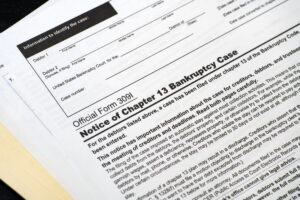When you file Chapter 7 bankruptcy, all of your dischargeable debts will be eliminated about 90 days after your attorney files your bankruptcy petition. When the discharge order enters, you are no longer legally liable for those debts.
Notice I emphasized the word “dischargeable”. If you are considering bankruptcy, it’s important to know that bankruptcy does not eliminate all kinds of debts. While most consumer debts, like credit cards, medical bills, and other loans will be discharged, there are exceptions. One of the things you hire a bankruptcy attorney for is to learn whether or not your debts will be discharged.
Section 523(a) of the Bankruptcy Code gives a complete list of debts that will not be eliminated in a Chapter 7 bankruptcy. Below is a summary of Section 523(a) and debts that won’t be discharged:
- Certain taxes;
- Debts for money, property, or services that were obtained by false pretenses, false representations, or fraud;
- Consumer debts owed to a single creditor and aggregating more than $500 for luxury goods or services incurred by an individual debtor on or within 90 days before filing;
- Cash advances aggregating more than $750 that are extensions of consumer credit under an open end credit plan obtained by an individual debtor on or within 70 days before filing;
- Debts that aren’t listed on your bankruptcy petition;
- Debts for fraud while acting in a fiduciary capacity, embezzlement, or larceny;
- Domestic support obligations (alimony or child support);
- Debts for willful and malicious injury to another person or property;
- Court ordered restitution;
- Students loans except where the debtor can show undue hardship;
- Debts for death or personal injury caused by the debtor’s operation of a motor vehicle, vessel, or aircraft if such operation was unlawful because the debtor was intoxicated from using alcohol, a drug, or another substance;
- Debts which should have been listed in a prior bankruptcy, or where the debtor waived discharge, or was previously denied discharge;
- Debts to a spouse, former spouse, or child of the debtor and not a domestic support obligation that are incurred by the debtor in the course of a divorce or separation or in connection with a separation agreement, divorce decree or other order of a court of record, or a determination made in accordance with State or territorial law by a governmental unit;
- Homeowners association dues that arise after the bankruptcy petition has been filed;
Section 523(a) covers a few other things that I didn’t include, but these are the most common kinds of debts that won’t be discharged in a Chapter 7 bankruptcy. Keep in mind, though, that Chapter 13 bankruptcy will discharge some of these debts, like debts to a former spouse that are not in the nature of a domestic support obligation.
The best way to learn if your debts will be discharged is to talk with a bankruptcy attorney. Our consultations are free and require no obligation. After your consultation you’ll know whether your debts are dischargeable and what the bankruptcy process involves and how much it will cost.


